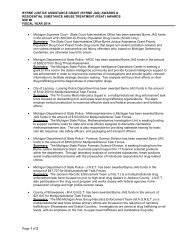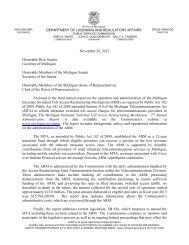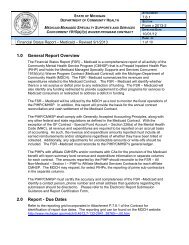michigan hypertension core curriculum - State of Michigan
michigan hypertension core curriculum - State of Michigan
michigan hypertension core curriculum - State of Michigan
You also want an ePaper? Increase the reach of your titles
YUMPU automatically turns print PDFs into web optimized ePapers that Google loves.
(mean age, 54 years). Overall, ACE inhibitors were found to have a modest collective effect in reducing<br />
BP. The mean reduction in SBP ranged between 6 mm Hg and 9 mm Hg, and the mean reduction<br />
in DBP was 4-5 mm Hg. 11 It was notable that all the ACE inhibitors studied were homogeneous in<br />
their efficacy and that lower doses were generally as effective in reducing BP as the manufacturer’s<br />
maximum recommended doses. This observation can be most readily explained by the fact that ACE<br />
inhibitors have relatively flat-dose-response curves.<br />
ACE inhibitors are notable for a low incidence <strong>of</strong> side effects and ease <strong>of</strong> dosing. For this<br />
reason they are very popular antihypertensive agents in clinical practice, though, as noted under the<br />
diuretic section above, national guidelines continue to endorse the use <strong>of</strong> thiazide diuretics as first<br />
line agents for the treatment <strong>of</strong> uncomplicated <strong>hypertension</strong>. They have traditionally been perceived<br />
to be more effective in Caucasians and younger patients, though more recent data suggests they are<br />
effective in African American patients, as well, with perhaps higher dosing. Race, however, should<br />
never be sole criterion upon which an ACE inhibitor or any other antihypertensive agent is either<br />
chosen or avoided. 12<br />
The ACE inhibitors have pleiotropic effects on the renal and cardiovascular systems making<br />
them ideal antihypertensive agents for specific medical populations. There is some evidence that they<br />
have a beneficial effect on glucose metabolism (improve glucose tolerance without affecting fasting<br />
glucose levels) and appear to delay the onset <strong>of</strong> type 2 diabetes. These agents reduce preload<br />
and afterload, down-regulate sympathetic activity by blocking the facilitating effects <strong>of</strong> angiotensin II<br />
on sympathetic nerves, and promote renal excretion <strong>of</strong> sodium and water by blocking the effects <strong>of</strong><br />
angiotensin II in the proximal tubule and by antagonizing angiotensin II-mediated aldosterone secretion.<br />
ACE inhibitors also inhibit cardiac and vascular remodeling associated with chronic <strong>hypertension</strong> and<br />
heart failure. All <strong>of</strong> these qualities make ACE inhibitors excellent antihypertensives for the treatment<br />
<strong>of</strong> patients with heart failure and following myocardial infarction for which they have been shown<br />
to reduce mortality in multiple clinical trials. Finally, there is abundant evidence from many clinical<br />
trials demonstrating that the ACE inhibitors are effective in reducing proteinuria and decreasing the<br />
rate <strong>of</strong> decline in kidney function in patients with chronic kidney disease. While strict control <strong>of</strong> BP<br />
appears to be the most important in regards to preservation <strong>of</strong> kidney function, it also appears that the<br />
ACE inhibitors have a beneficial effect on renal function – especially amongst those individuals with<br />
NKFM & MDCH 193

















